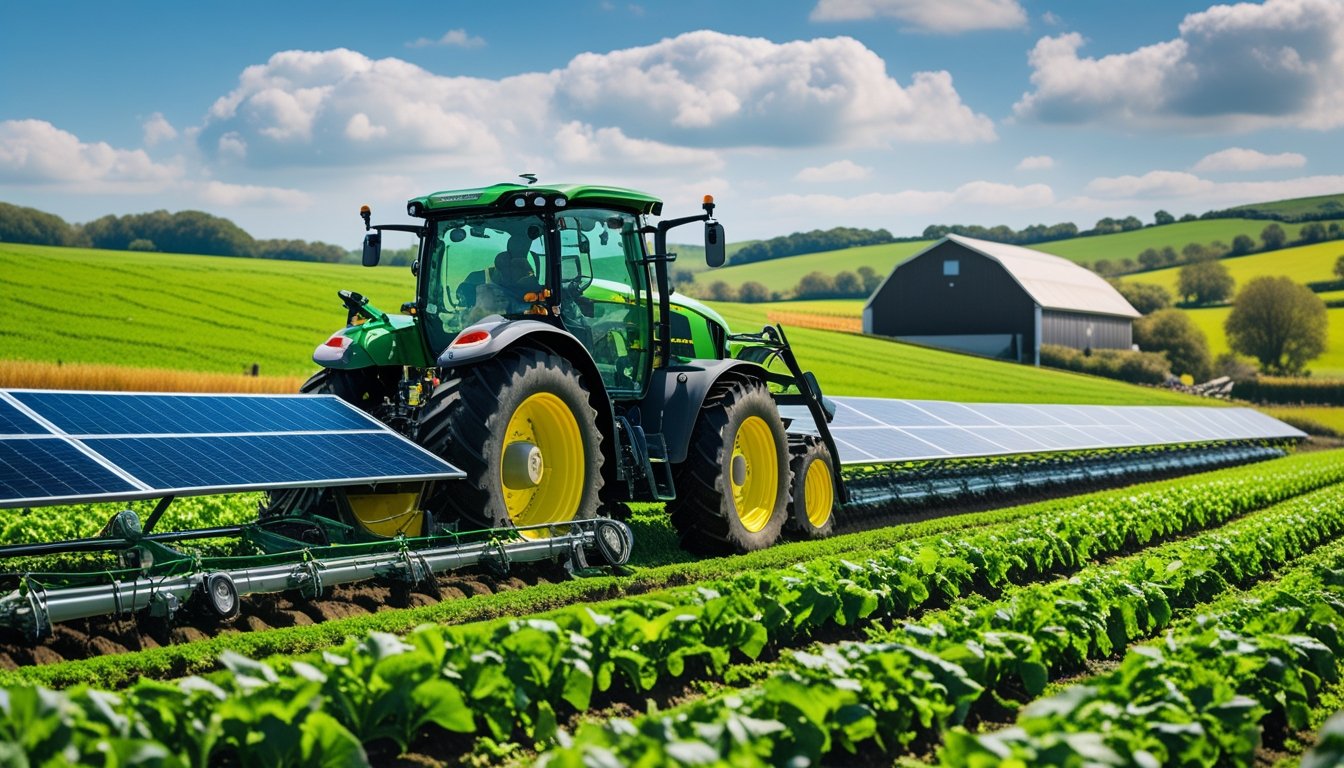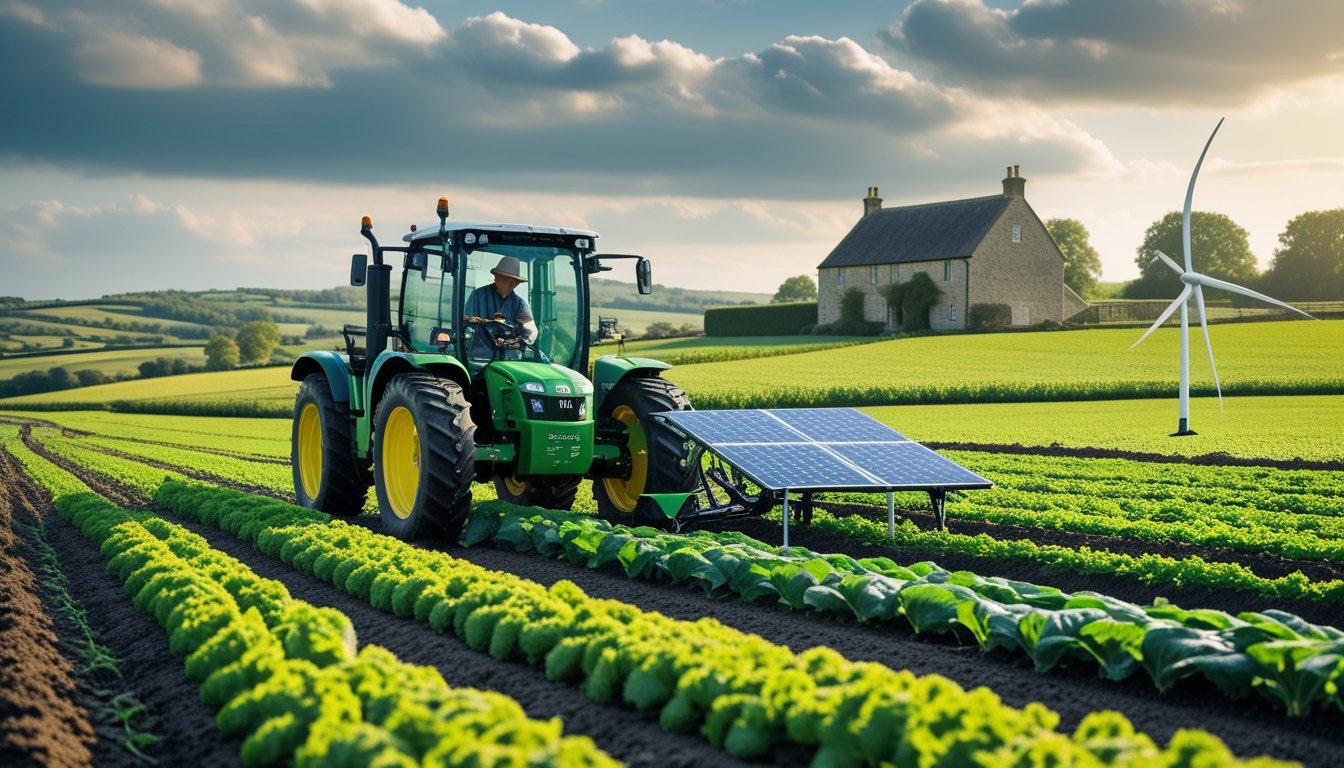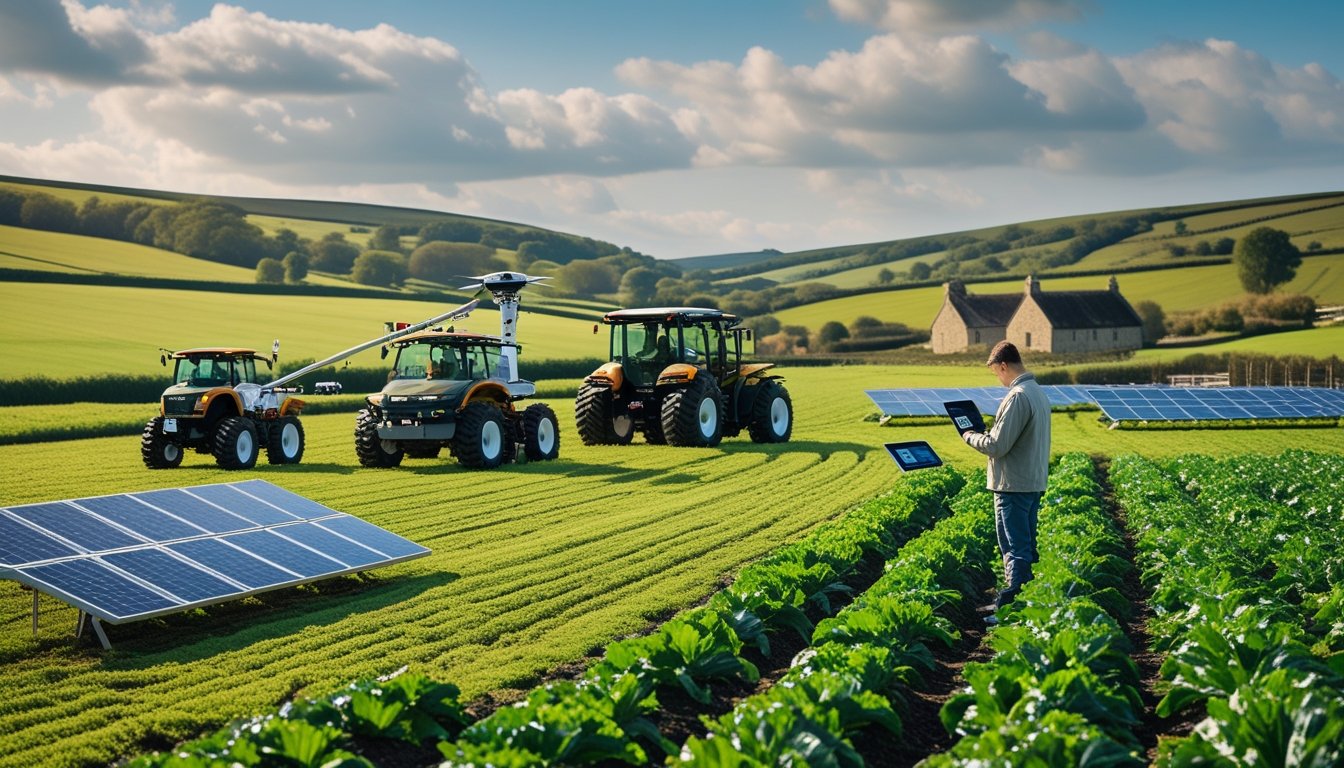Late updated: 22 Jun 2025 15:06
Written by: Oliver Bennett
Efficient Farming Technologies For UK Countryside: Innovations Boosting Productivity
The British countryside is witnessing a transformative shift in farming practices. Thanks to technological innovations, productivity and sustainability are reaching new heights. Smart farming technologies, such as IoT sensors and AI-driven systems, are paving the way for more efficient and sustainable agricultural practices. From monitoring soil conditions to predicting crop yields, these advancements are enabling farmers to enhance efficiency and profitability.

As agriculture in the UK embraces precision techniques, we see a growing emphasis on reducing environmental impact and boosting resource use efficiency. Cutting-edge farm management software and crop monitoring systems are central to this progress. They help strike a balance between high crop yields and reduced agricultural inputs, contributing to heightened biodiversity and ecological harmony.
This evolution not only supports the economic viability of farms but also aligns with global environmental goals. By integrating advanced technologies into everyday farming, we are setting a precedent for a more sustainable and resilient future for UK agriculture. Our exploration of these technologies showcases their pivotal role in shaping the future of farming.
Key Takeaways
- Efficient tech boosts farming productivity and sustainability.
- Smart tools reduce inputs and enhance ecological balance.
- UK agriculture sets a sustainable future precedent.
Core Technologies Revolutionising UK Countryside Farming
Our exploration of efficient farming technologies reveals a suite of innovations that are transforming the UK countryside. This includes the implementation of precision agriculture, adoption of robotics and smart machinery, use of satellite imagery and remote sensing, and incorporation of artificial intelligence and machine learning applications that collectively enhance farm productivity and decision-making.
Precision Agriculture Advancements
Precision agriculture is driving a significant shift in farming practices across the UK. It leverages data-driven agriculture and various technologies, such as GPS-guided machinery and precision planting. These innovations enable us to optimise crop yields and reduce waste. By using precision techniques, farmers can apply water, fertilizer, and pesticides in precise amounts. This not only boosts productivity but also reduces environmental impact.
Crop monitoring systems also play a crucial role. With advanced IoT sensors, farmers can continuously assess soil conditions and crop health. This real-time data empowers us to make informed decisions, leading to better resource allocation and enhanced farm management solutions. Consequently, precision farming has become an essential component of modern agricultural productivity.
Robotics and Smart Machinery
Robotics and smart machinery are at the forefront of agritech innovations. Autonomous tractors and robotics are minimising human labour while increasing efficiency. These machines can perform tasks such as planting, harvesting, and weed control with high precision.
The integration of robotic technology into farming processes increases overall farm productivity and allows us to tackle labour shortages. Smart farming tools equipped with IoT devices further streamline operations. This includes automated irrigation and controlled environment systems that cater to the unique needs of each farm.
Satellite Imagery and Remote Sensing
Satellite imagery and remote sensing offer powerful tools for observing and managing vast tracts of agricultural land. These technologies provide a bird's-eye view, enabling us to monitor crop health and soil conditions across large areas.
Through the use of remote sensing, farmers can detect stress factors, such as diseases or nutrient deficiencies, early in the crop cycle. This proactive approach allows for timely interventions, ensuring that resources are applied efficiently. Additionally, remote sensing data aids in tracking weather patterns, helping us plan better and mitigate the risks associated with climate variability.
Artificial Intelligence and Machine Learning Applications
Artificial intelligence (AI) and machine learning are revolutionising farm management in the UK. AI's role in predictive analytics allows us to forecast crop yields and optimise resource usage. Machine learning algorithms process vast datasets to deliver insights into trends and future challenges. Such predictive algorithms guide decision-making, reducing uncertainties in the farming process.
The concept of digital twins enables us to simulate various scenarios in a virtual environment. This gives farmers a chance to test different approaches and outcomes without real-world risks. By leveraging AI-driven smart farming tools, agricultural productivity sees a marked improvement, with operations becoming more efficient and sustainable. The integration of these technologies stands at the heart of the next phase of British agriculture.
Sustainable and Resilient Farming Solutions

Our focus on sustainable and resilient farming solutions is transforming the UK's agricultural landscape. By integrating innovative practices such as vertical farming and efficient resource management, we can achieve improved crop yields while minimizing environmental impact. The advancements outlined below illustrate the path towards a more sustainable future for British agriculture.
Sustainable Farming Practices for British Agriculture
Sustainable farming practices are vital for ensuring long-term food security and maintaining soil health. By implementing reduced tillage, we can decrease soil erosion and enhance water retention. Regenerative farming practices, such as crop rotation and cover cropping, improve soil fertility and capture carbon, reducing our carbon footprint.
Emphasising biodiversity within farming ecosystems supports pest and disease management while promoting environmental sustainability. Agroforestry, incorporating trees and shrubs into agricultural systems, bolsters soil structure and offers alternative income streams. These practices help to sustain the rural economy and respond effectively to climate change.
Vertical and Indoor Farming Innovations
Vertical and indoor farming innovations offer solutions to challenges like land scarcity and unpredictable weather conditions. These systems utilize vertical farming technologies to grow plants in stacked layers, enabling year-round production in controlled environments. Through precise crop management and climate control, we can optimize resource efficiency and reduce water usage significantly.
By minimizing the need for pesticides, such systems contribute to healthier produce and lower environmental impact. Indoor farming also creates opportunities for job creation, addressing labour shortages in the agricultural sector. These innovations promise increased crop yields and enhanced food security without expanding our carbon footprint.
Resource Management and Environmental Impact
Effective resource management is critical to reducing our environmental impact and ensuring sustainability. By optimising water usage, we're addressing water scarcity while supporting crop resilience. Implementing advanced irrigation systems and using sensors for crop health monitoring are key strategies.
Furthermore, precision agriculture tools improve input use efficiency, minimizing waste and conserving resources. Decreasing greenhouse gas emissions and managing the carbon footprint of farming operations are priorities. By focusing on these areas, we can achieve sustainable farming while mitigating the adverse effects of climate change and protecting our natural environment.
Frequently Asked Questions

Our exploration covers advancements in precision agriculture beneficial to UK farmers, renewable energy sources influencing farming efficiency, and how automation enhances productivity. We also discuss cost-effective crop management systems, livestock monitoring technology, and the impact of government policy on adopting efficient farming technologies. Let's address these topics comprehensively.
What advancements in precision agriculture are most beneficial for UK farmers?
Precision agriculture technologies, such as GPS-guided equipment and soil sensors, have revolutionised UK farming. These tools allow for precise crop management, optimising fertiliser and pesticide application. This results in improved yields and reduced environmental impact. Farmers benefit significantly from these technologies, achieving sustainability and cost efficiency.
How do renewable energy sources influence farming efficiency in the UK countryside?
Renewable energy, particularly solar and wind power, plays an essential role in enhancing farming efficiency in the UK. By reducing reliance on non-renewable energy, farmers can cut costs and lower carbon emissions. Implementing on-site renewable energy solutions has become a strategic advantage for many farms, promoting environmental sustainability.
What role does automation play in enhancing agricultural productivity in the UK?
Automation is transforming UK agriculture by streamlining various farming operations. Robotic harvesters and automated milking systems increase productivity, allowing farmers to focus on more strategic tasks. As labour shortages affect the sector, automation offers a viable solution, supporting continuous operations and improving overall farm management.
Which crop management systems are proving to be the most cost-effective for UK farmers?
Integrated crop management systems that utilise data analytics to inform decisions are proving highly cost-effective. These systems enable farmers to monitor crop health and optimise resource use. By leveraging technology to minimise waste and maximise yield, farmers can improve profitability and maintain sustainable practices.
How is livestock monitoring technology improving farming outcomes in the UK?
Livestock monitoring technologies, such as wearable sensors and automated health tracking systems, provide critical data on animal well-being. These advancements help farmers detect health issues early, reducing veterinary costs and improving productivity. The ability to monitor livestock in real time leads to better management decisions and enhanced animal welfare.
What impact do government policies have on the adoption of efficient farming technologies in the UK?
Government policies play a pivotal role in the adoption of efficient farming technologies. Funding initiatives, such as grants for precision agriculture or renewable energy installations, incentivise innovation. Additionally, regulations promoting sustainable practices encourage farmers to embrace tech-driven solutions, driving the sector toward a more efficient and environmentally conscious future.
